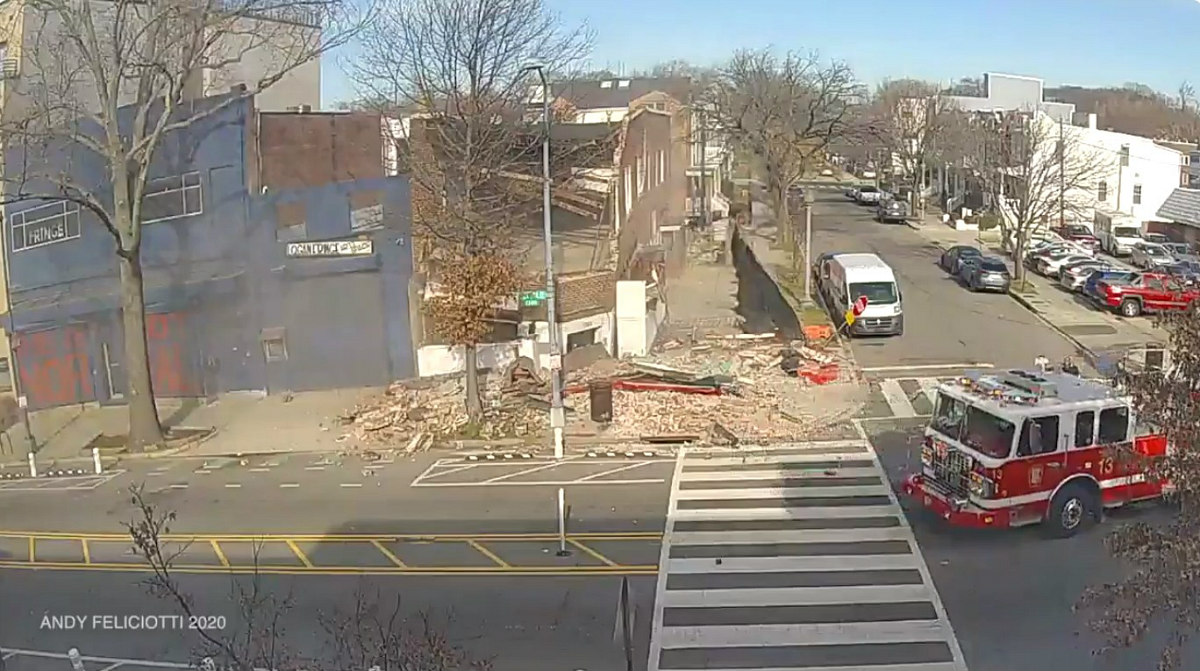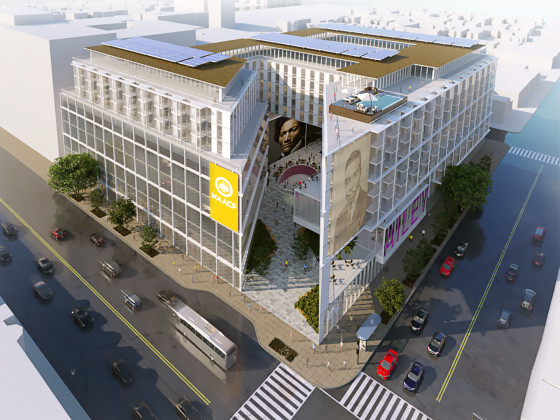 Too Much Digging, Not Enough Underpinning Caused Trinidad Building Collapse
Too Much Digging, Not Enough Underpinning Caused Trinidad Building Collapse
✉️ Want to forward this article? Click here.

In Jaunary, the dramatic collapse of a building under construction at 1102 Staples Street NE (map) was captured on video, inspiring speculation about what triggered the event and relief for the minimal injuries to workers and passers-by who crossed the street just seconds beforehand. Now, DC's Department of Consumer and Regulatory Affairs (DCRA) is offering some clarity on what happened and what will happen next.
The owner of the building, DCRA, and the District Department of Transportation (DDOT) were invited to a meeting of ANC 5D earlier this week. Donald Sullivan, DCRA's Program Manager for Vacant Building and Illegal Construction Administration, was the only one to attend the meeting, and he did his best to explain what led to the collapse.
On January 15th, the southeastern portion of the building buckled under its own weight because excavation work had gone too deep without enough underpinning installed to support that work. While it is not clear why excessive digging was done that day, the construction team had been completing its underpinning work according to the plans approved by DCRA. Ultimately, the lack of structural support "expedited gravity" and led to the building collapsing.
Sullivan noted that while the incident should not have happened, the building fell in the "best possible way", noting that there were workers beneath the building at the time of the collapse and that it was lucky that there weren't any fatalities.
After responding on the day of the collapse, Sullivan and other structural engineers opted to remove the "imminent danger hazard" by dismantling part of the roof and structure. The team also removed the debris from the collapse and put up fencing and barricades, and a stop-work order was issued.
The following week, DCRA's chief building official had a meeting with owner Dila Development, the structural engineers, the architect, the contractor, an inspection company and DCRA representatives from different departments. Upon review, DCRA found "no anomalies" in the plans; DDOT and the Department of Energy and the Environment were also involved in reviewing for public space permits and environmental hazards.
The development team has since submitted and received preliminary approval for a stabilization plan to reinforce the structure before other work can commence, but it cannot move forward with implementing the plan because they have not yet secured the proper public space permits.
To Sullivan's recollection, DCRA's construction plans did not require a covered walkway on the sidewalks adjacent to the building because the construction is not adding floors, although he could not speak to whether DDOT's public space review required a covered walkway, as was reported by WAMU last month.
Sullivan also noted that the developer has been responsive to DCRA and that the agency is considering changing its construction rules so that the structural engineer must be present on-site while work is ongoing. Currently, DCRA requires the structural engineer to make regular visits to the site.
"I am in the process of revamping some of the programs that we have in terms of illegal construction oversight with the city," Sullivan explained, confirming that residents should notify 311 if they are concerned about building work they see because resident inspectors can be dispatched 24 hours. Ultimately, however, an inspector wouldn't have necessarily noticed whether there was sufficient underpinning at the site; this particular incident was the result of a confluence of factors.
"When you look at the degree and the density of renovation and construction that are going on within the city right now, we don't see buildings dropping every day," Sullivan stated. "This was an anomaly, and there were some safeguards that the developers were supposed to do that they did not do, and there's a penalty for that."
DCRA has levied three fines thus far against the development team, and there may be additional fines moving forward. The site is permitted for a 14-unit, four-story building.
See other articles related to: building permits, construction, dcra, trinidad, trinidad dc
This article originally published at http://dc.urbanturf.production.logicbrush.com/articles/blog/too-much-digging-and-not-enough-underpinning-caused-trinidad-building-colla/16460.
Most Popular... This Week • Last 30 Days • Ever

Chris Hughes and husband Sean Eldridge are putting their Kalorama home on the market ... read »

Today, UrbanTurf is taking a look at the tax benefits associated with buying a home t... read »

Lincoln-Westmoreland Housing is moving forward with plans to replace an aging Shaw af... read »

Only a few large developments are still in the works along 14th Street, a corridor th... read »

A soccer stadium in Baltimore; the 101 on smart home cameras; and the epic fail of th... read »
DC Real Estate Guides
Short guides to navigating the DC-area real estate market
We've collected all our helpful guides for buying, selling and renting in and around Washington, DC in one place. Start browsing below!
First-Timer Primers
Intro guides for first-time home buyers
Unique Spaces
Awesome and unusual real estate from across the DC Metro













